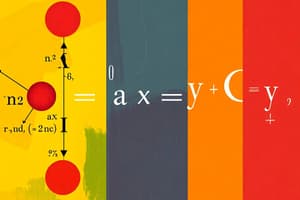Podcast
Questions and Answers
What are propositions in logic?
What are propositions in logic?
- Simple statements that can be either true or false (correct)
- Complex statements that can only be true
- Statements that are always true
- Statements that are always false
Why is it essential to accept the truth or falsity of a statement as presented in the problem?
Why is it essential to accept the truth or falsity of a statement as presented in the problem?
- To make the problem more interesting
- To challenge the validity of the statement
- To align with everyday understanding of reality
- To work with the information within the context of the problem (correct)
What role does critical thinking play in logic?
What role does critical thinking play in logic?
- It involves creating new connections based on what we know to be true (correct)
- It involves sticking to existing beliefs without questioning
- It involves blindly following given information
- It involves accepting everything as true without analysis
Which of the following qualifies as a proposition in logic?
Which of the following qualifies as a proposition in logic?
What is the main characteristic of propositions in logic?
What is the main characteristic of propositions in logic?
How does critical thinking help in logical deduction?
How does critical thinking help in logical deduction?
What is the role of logic in mathematics?
What is the role of logic in mathematics?
How can logic statements in mathematics be formulated?
How can logic statements in mathematics be formulated?
What is a logical fallacy known as 'Hasty Generalization'?
What is a logical fallacy known as 'Hasty Generalization'?
Which type of logical fallacy involves responding to a question with 'Because I said so'?
Which type of logical fallacy involves responding to a question with 'Because I said so'?
What does the 'False Cause' logical fallacy entail?
What does the 'False Cause' logical fallacy entail?
What characterizes the 'Limited Choice' logical fallacy?
What characterizes the 'Limited Choice' logical fallacy?
What is the main purpose of understanding logical fallacies?
What is the main purpose of understanding logical fallacies?
What is the systematic examination of propositions that can be classified as true or false called?
What is the systematic examination of propositions that can be classified as true or false called?
Which types of propositions are used to generate new connections based on known truths?
Which types of propositions are used to generate new connections based on known truths?
What are logical fallacies characterized by?
What are logical fallacies characterized by?
Flashcards are hidden until you start studying
Study Notes
Propositions in Logic
- Propositions are declarative statements that can be classified as either true or false.
- Accepting the truth or falsity of a statement is crucial for problem-solving and logical reasoning.
- The validity of conclusions hinges on the truth values of the propositions involved.
Role of Critical Thinking
- Critical thinking is essential for evaluating arguments, identifying flaws, and forming sound conclusions.
- It enhances logical deduction by allowing individuals to assess evidence and reasoning systematically.
Characteristics of Propositions
- Propositions must have a definitive truth value; they cannot be ambiguous or subjective.
- A clear assertion is central to distinguishing propositions from other types of statements.
Logic and Mathematics
- Logic serves as a foundational element in mathematics, providing the structure necessary for mathematical reasoning.
- Mathematical statements can be formulated as propositions, often expressed through equations or inequalities.
Logical Fallacies
- A Hasty Generalization occurs when a conclusion is drawn from insufficient evidence or an unrepresentative sample.
- The Appeal to Authority fallacy manifests when one responds to a question with "Because I said so," disregarding logical reasoning.
- The False Cause fallacy mistakenly attributes causation between two events without adequate evidence or correlation.
- The Limited Choice fallacy occurs when only a few options are presented as the only possibilities, ignoring other alternatives.
Understanding Logical Fallacies
- Recognizing logical fallacies is critical for improving reasoning skills and avoiding flawed arguments.
- Logical fallacies are characterized by errors in reasoning that undermine the validity of an argument.
Systematic Examination of Propositions
- The systematic examination of propositions that can be classified as true or false is known as formal logic.
- Propositions are used to generate new connections based on previously established truths through logical inference.
Studying That Suits You
Use AI to generate personalized quizzes and flashcards to suit your learning preferences.




